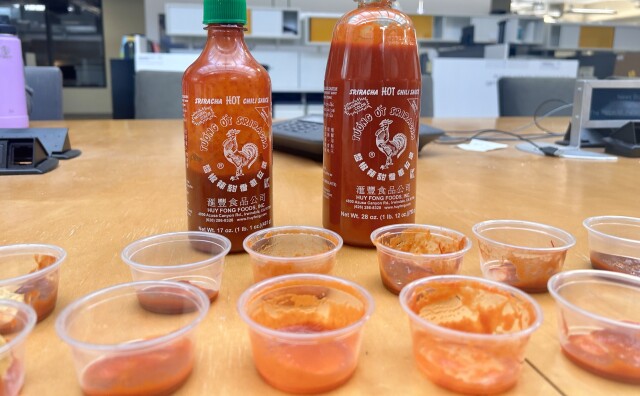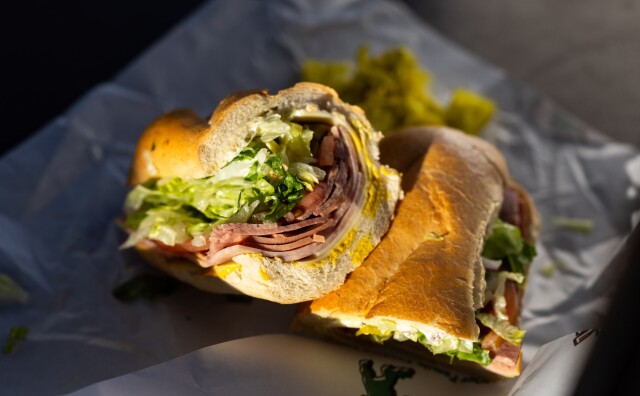Todo Verde Wants To Decolonize Your Diet With Vegan Ceviche
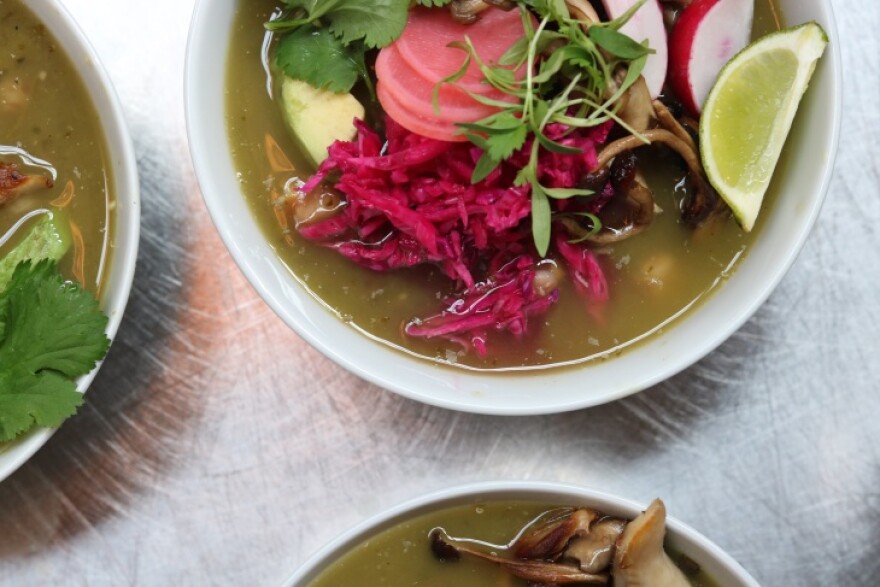
Ceviche was probably the toughest dish for chef Jocelyn Ramirez to recreate after she became a vegan.
She'd already developed an almond-based mole that she spooned over oven-roast oyster mushrooms. She figured out how to make sopa de fideo, a noodle soup with a tomato-heavy broth, without chicken and topped with tofu instead of queso fresco. She even managed to recreate her family's pipián sauce, a recipe her grandmother had brought with her from Zacatecas, Mexico (hint: start by toasting pumpkin seeds and frying guajillo chiles). But ceviche?
"That was something that, as a vegan, seemed unattainable," Ramirez says.
Her aspirations go far beyond mastering faux fish and queso fresco. Ramirez, the 34-year-old founder of Todo Verde, wants to decolonize your diet while creating a focal point for health and wellness in East L.A.
She started her business in 2015, selling smoothies and aguas frescas at farmers markets and is now trying to open a brick-and-mortar cafe — with a little help from a fundraising campaign that's about to wrap up. With three days left, she needs less than $7,000 to reach her $50,000 goal.
She envisions opening the first Todo Verde in Boyle Heights and branching out from there, focusing on communities like South Gate, where she grew up. These cities and neighborhoods, sometimes referred to as "food deserts," are often dotted with fast food franchises, mini-markets and liquor stores but not many places to buy fresh fruit and vegetables.
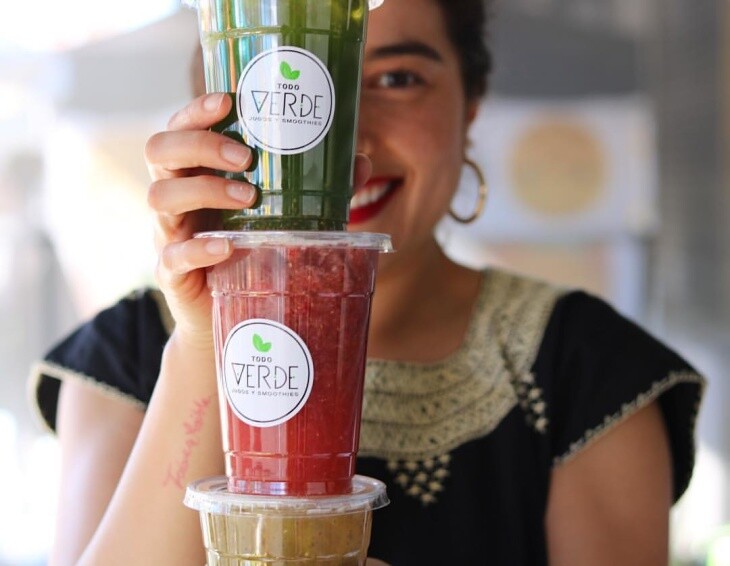
Ramirez is part of a larger movement, the rise of vegan-Mex cuisine. Journalist Gustavo Arellano recently explored the trend for NPR. "Vegan-Mex is changing the conversation about what vegan food actually is," he says. That too is part of Ramirez's goal.
"It's really important because [veganism] has been marketed as this white thing," Ramirez says. "Veganism is oftentimes seen as an all-white or as a trendy thing. Really, it's been in our communities for generations and generations."
In the past year-and-a-half, the long simmering vegan-Mex trend has bubbled up to the surface with a new crop of businesses catering to young, Latinx crowds. Vegan By Victoria is known for its pan dulce, made with coconut milk instead of dairy. Taquería La Venganza beat out a host of meaty rivals to win the top prize at L.A. Taco's most recent Taco Madness throwdown. Vegatinos pops up around town — including in Panorama City and at Donut Friend in Highland Park — with its animal-free tacos, burritos, papas locas, red pozole and flan.
With the increase in popularity, some of these businesses are ready to take the next step.
Indigenous Veganism
Ramirez had no formal training in the culinary world when she launched Todo Verde but she had plenty of experience with her body.
In her 20s, she began struggling with a thyroid issue. "I was trying to figure out, how is it that I'm already dealing with this? Many doctors are telling me that I need to remove it and take hormone pills for the rest of my life. It really pushed me to look at my diet," Ramirez says. She soon went vegetarian.
A year or two later, she attended a workshop about indigenous veganism that, she says, "blew my mind." It was taught by scholar, culinary anthropologist and plant-based chef Claudia Serrato, who works with predominantly native cuisine, using foods that are indigenous to the Americas.
When people talk about "traditional Mexican food," she wonders, "traditional to who?"
"It is one thing to make chicken enchiladas and say that this is a traditional dish," Serrato says, "but chicken got introduced by the colonizers. If we really want to be traditional, we should use duck or quail or maybe deer."
Arellano echoes that. "Latinos basically ate a vegan diet before conquest, so it always striked me as odd when Mexicans say, 'Oh, carne asada's real Mexican food. Carnitas, el pastor tacos.' None of those existed until Cortez and his Spaniards came over and introduced them to Mexico. Before then, Mexicans did eat meat, but it was always very limited. There were no chickens in the new world."
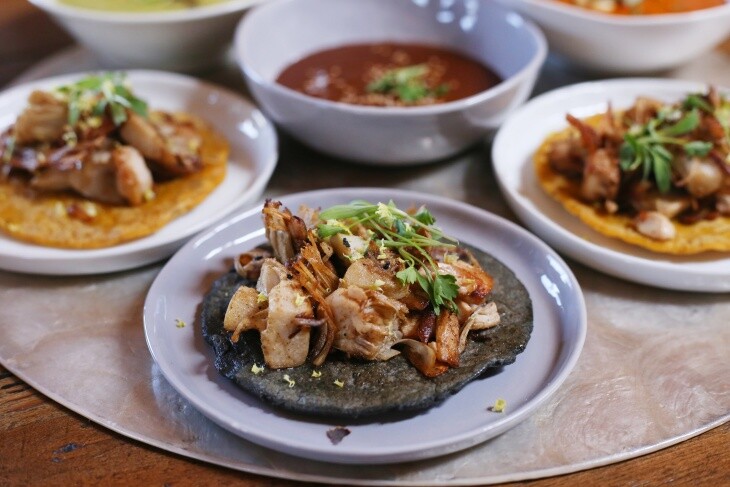
The Resistance
Still, "converting" meat-eaters has not been easy. "The people that have given me the most resistance were my family and some community members," Serrato says. "They affiliated me wanting to center plant-based foods as me trying to no longer be Mexican or no longer be Chicano. They affiliated it with whiteness. But what I do is actually remake the same foods that speak to my culture using alternative ingredients."
Once she began to recreate these flavors, she says her family was supportive because the flavor was still there and (bonus!) the food was healthier.
"My target market is really a person who may have been drinking Coke for many years. How do you get somebody to slowly change directions and try something that's still delicious but not bad for you?," Ramirez says.
The key for Ramirez and others working in this area is to bring their flavors to their communities.
The Acceptance
"This new generation, they make it happen," Arellano says. "Is it the mainstream? No, it's not. Vegan-Mex food is the 'Latinx' of food. Is Latinx a mainstream term? No. But are young people using it more and more? Absolutely. Are older people befuddled at its popularity? Absolutely. Same thing with vegan-Mex."
Serrato has a similar understanding. "The younger generations have arrived at a place of saying, 'Wait a minute, we need to recenter these foods as part of our diets,'" she says.
Back To The Ceviche
After a few months of testing and experimenting, Ramirez figured out how to make the raw seafood dish using hearts of palm rather than fish. "I actually made it with my parents yesterday," she says. "It's something that they love now. It tastes just as good. It's just as flavorful. It's just about the same amount of seasoning and love."
Having her family in the kitchen is a crucial part of her operation. Ramirez's grandmother has passed away but her mom is part of the kitchen team for Todo Verde. "So when I create a dish like a pipián sauce," which Ramirez serves with jackfruit instead of meat, "I always ask her, 'Do you think she would approve?' And she's like, 'Yes. It tastes just like it.'"
-
After people began complaining online that Sriracha they'd bought recently didn't taste like the old stuff, we set out to find the answer. It didn't go well.
-
From tortas to tuna melts, all sandwiches tell a unique story as they celebrate Los Angeles' diverse tapestry of flavors with each bite.
-
The company behind Sriracha told us production has resumed.
-
Dustin Bartz has figured out a way to sell a $6 smashburger — and still make a tidy profit. He enjoys trolling competitors who charge more.
-
Two amateur bakers take on a beloved, almost sacrosanct school treasure.
-
For Jeff Alulis, the Burger Quest became “something bigger” than him.

